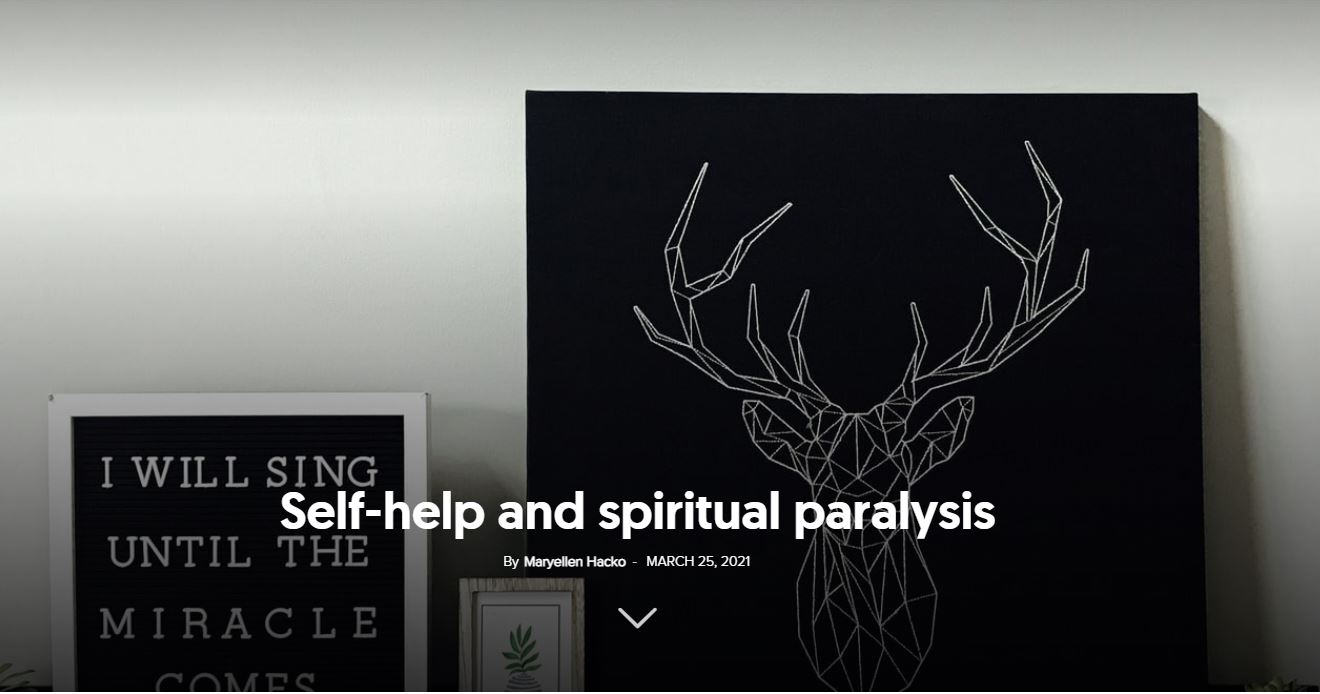Almost all bookstores today have a section dedicated to books on change, except that the generic name given to this category is “personal development”, or “self-help“.
Unfortunately, this label does not guarantee the quality of the contents of these books, and often they are the exact opposite of quality. Browsing through entire shelves of personal development books, we discover an overflow of volumes with very bold titles, but which barely manage to scratch the surface of the topics they address.
And, because there are so many titles that make waves, arrogating to themselves the ultimate remedy for giving up X habit or polishing Y quality, it’s very difficult, if not impossible, for the average reader to get to those works that are really valuable, propose verified solutions, and are not experiments at the reader’s expense. This happens, of course, if they don’t have the opportunity to ask for suggestions of useful titles from a specialist in whose criteria they trust.
Three psychologists contributed their suggestions to the reading list below—Cristina Iancu, Bogdan Tulbure and Maria Nistor. Each proposed books from three major areas of development: personal, love, and parenting. To their recommendations, I will add a reading suggestion on spiritual change.
How Emotions Are Made: The Secret Life of the Brain
Lisa Feldman Barret, 448 pages, Houghton Mifflin Harcourt, 2017
Lisa Feldman Barret is Professor Emeritus of Psychology at Northeastern University in Boston, USA, and her work in psychology and neuroscience is considered revolutionary. In 2007 she was awarded the Director’s Pioneer Award from the National Institutes of Health in the United States, and in 2019 she received a Guggenheim Fellowship in neuroscience, to study the neurophysiological mechanisms of emotion.
Feldman Barret conceived the theory of constructed emotion, a scientific theory according to which our emotions are not biologically programmed and do not simply “happen” to us. Barret argues, based on nearly 30 years of experience in emotion research, that people do not have emotional circuits in the brain. According to the author, emotions are assumptions that the brain makes on the spot, to explain certain physiological sensations, which it decodes in one way or another, based on previous experience. This mechanism is good news, says Feldman Barret, because it means that people are not at the mercy of emotional circuits buried deep in some ancient depths of the brain.
The grand thesis of the book is that people have much more control over their emotions than they imagine. Because she sees emotions as an interpretation of reality through the filter of a repertoire of experiences, perceptions, and behaviours, Feldman Barret argues that, in order to change our entire emotional life, we need to change the ingredients which the brain uses to build our emotions.
Stress Counselling: A Rational Emotive Behaviour Approach
Albert Ellis, Jack Gordon, Michael Neenan, Stephen Palmer, 208 pages, SAGE Publications, 2001
Albert Ellis, a psychologist and psychotherapist, and the founder of rational-emotional behavioural therapy (REBT), has written more than 80 books. In 2013, the Association of Psychologists of America posthumously awarded him the prize for outstanding contributions to the field of psychology.
Jack Gordon is a psychologist and practices rational-emotional behavioural psychotherapy. He has written six books on overcoming emotional issues through REBT.
Michael Neenan runs the Kent Stress Management Center and is a cognitive-behavioural therapist.
Stephen Palmer is a psychologist and psychotherapist who teaches stress management at the University of Middlesex. He founded the Centre for Stress Management in London and has published over 50 books on stress and cognitive-behavioural therapy.
To those who have told themselves, even once, that they need a lifestyle change, Stress Counselling responds by offering rigour and method to their desire to get rid of stress. The volume is addressed to therapists and is packed with strategies and intervention techniques for counteracting irrational beliefs and cultivating a rational approach to emotions and behaviours.
The book has a section dedicated to recovering after relapse in the change process, and is rich in practical recommendations, meant to support the change process so that the gains obtained through its implementation are not lost.
Hold me tight: Your Guide to the Most Successful Approach to Building Loving Relationships
Dr Sue Johnson, 320 pages, Little, Brown Book Group, 2011
Dr Susan M. Johnson is a clinical psychologist specializing in couples therapy, professor emeritus of psychology at the University of Ottawa (Canada). In 2016, the American Psychotherapy Association named her Family Psychologist of the Year, and in 2017 she became a member of the Order of Canada. Together with Les Greenberg, she is valued for the development of emotionally-focused couples and family therapy, an approach that draws its roots from attachment theory. The latter argues that the relationships we have in childhood with our caregivers end up determining the relationships we will have in adulthood.
Hold Me Tight is a book written for the general public, which demonstrates through many practical examples that love has the amazing ability to heal the wounds that life sometimes inflicts on us. “The most functional way to regulate difficult emotions in love relationships is to share them,” says the author, who proposes transforming relationships that need change by exposing our vulnerabilities to the other, to create connection.
Eight Dates: Essential Conversations for a Lifetime of Love
John Gottman, Julie Schwartz Gottman, Doug Abrams, Rachel Carlton Abrams, 224 pages, Workman Publishing Company, 2019
John and Julie Gottman are a couple of therapists who need no introduction. Initiators of the Gottman Institute in Seattle (nicknamed the Love Lab), the authors are also the creators of an eight-step program to strengthen or revitalize romantic relationships. Eight Dates aims to change the communication between partners by developing the skills to communicate on essential topics.
The volume includes numerous tips and exercises to stimulate deeper discussions in the relationship and to discover new depths of intimacy. Can a rocky relationship go through a change so significant that it will flourish? John and Julie Gottman think so. One of the greatest gifts for a relationship or marriage, they say in the book, “is the ability to see the world through the eyes of another person, intimately, deeply, profoundly, in a way we’re almost never able to do with another human being. If you approach the mystery that is your partner with curiosity, your relationship and your life will be immeasurably enriched.”
Reinventing Your Life: The Breakthrough Program to End Negative Behaviour and Feel Great Again
Jeffrey E. Young, Janet S. Klosko, 365 pages, Plume, 1994
Jeffrey E. Young, the founder of schema therapy, is the director and trainer of the Schema Therapy Institute in New York. The co-director is Janet S. Klosko, who specializes in anxiety psychotherapy.
Considered a bible of schema therapy, the book aims to identify and help change negative thought patterns. The volume describes 11 of the most common mental “traps” in which we can get caught, provides a diagnostic test for each of them, and step-by-step solutions for escaping from these traps.
How to heal the pain caused by abandonment, but also the emotional damage caused by addiction, trust issues, rejection, emotional poverty, failure and vulnerability—all these issues are discussed in a framework rigorously documented and generously argued for with case studies.
Despite the commercial title, the book outlines a solid vision, and a philosophy of change based on principles such as: creating a personal perspective, self-confrontation with empathy and asking for help. Aaron T. Beck, the father of cognitive-behavioural therapy, says in the book’s preface that this is the result of “pioneering work in developing and making available to the public a powerful set of tools for making significant life changes in relationships and at work.”
Raising a Secure Child: How Circle of Security Parenting Can Help You Nurture Your Child’s Attachment, Emotional Resilience, and Freedom to Explore
Kent Hoffman, Glen Cooper, Bert Powell 280 pages, Guilford Publications, 2017
Kent Hoffman, Glen Cooper, and Bert Powell, psychoanalytic psychotherapists with over 30 years of experience in treating children and adolescents, work at the Circle of Security International in Spokane, Washington, training parents and psychologists in the “circle of security” intervention method, based on attachment theory.
Their volume is addressed to parents who want to stop suffocating their children with their hyper-protective love and instead cultivate their autonomy, in an emotional setting that gives them the security they need. The book also responds to parents who have reached their wit’s end due to their children’s problematic behaviour and are looking for solutions.
From the many life stories it presents and with the help of the unique practical tools it makes available to readers, the book outlines a vision of healthy attachment, teaching parents to understand themselves first, in order to then build an environment conducive to emotional development for their children.
How People Change
Timothy S. Lane, Paul David Tripp, 230 pages, New Growth Press, 2008
Timothy S. Lane is the founder and president of the Institute for Pastoral Care (USA), a pastor in the Presbyterian Church, and author of several books on anxiety (Living Without Worry: How To Replace Anxiety with Peace, 2015), post-traumatic stress disorder, forgiveness, sex, family conflicts and guilt.
Paul David Tripp is a pastor and a prolific author on Christian life. Through his books, he wants to “connect the transforming power of Jesus Christ to everyday life.”
How People Change contains a feature that the self-help books simply cannot accommodate: it places the merits of personal transformation not on the individual who must transforms themself, but on a God who lovingly remodels the individual. Full of evocations from the pastoral experiences of the two authors, the volume breaks many patterns of erroneous religious thinking with an accuracy that brings satisfaction to readers who may be stuck on their own path of personal transformation. “There is nothing new in this book,” the authors warn. “We are very excited to offer you something you already know, but may not understand fully and practically.”
No one seeks change for the sake of change. Even those who say that they are addicted to change or novelty have a deeper need that they want to fulfil, more or less consciously, through this recourse to transformation. Therefore, in order to fully enjoy change, it is good to be consciously connected to its roots. This reading list is by no means exhaustive, but as long as we make it a tool for change, it can lead us to truly informed choices.
You may also like:




















